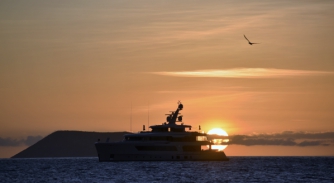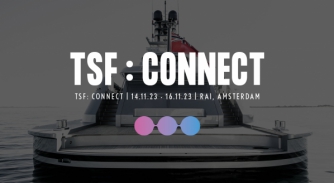Unmanaged risk: part 2
PYA CEO Christophe Bourillon outlines the superyacht industry's pathway through sustainability reporting and towards innovative future development…
With 30 years of experience in senior management, public affairs and crisis communication at the national and international levels, Christophe Bourillon has founded and led various industry associations, such as Wind Europe. He has also driven other organisations through major transformations, including the World Nuclear Association, the European Biofuels Association and the World Federation of Science Journalists.
He has managed government relations campaigns for the oil and gas, nuclear and other industries. As an accredited expert to the United Nations, he participated in the negotiations of the UN Convention on Climate Change for more than 15 years. Currently, Christophe serves as the CEO of the Professional Yachting Association (PYA).
In the follow-up to his first opinion piece, he shares his thoughts with SuperyachtNews on the unmanaged risk that the superyacht industry faces in the court of public opinion.
Politicians listen to voters
Members of the general public are also voters and, simply put, elected officials and regulators listen to the voters. Over these past few months, we have seen several major international regulatory organisations taking a keen interest in superyachts. At the international level, for the first time, the most recent IMO Greenhouse Gas Study is taking into consideration yachts, which are reported to have seen the greatest increase in total greenhouse gas emissions (ref. 10).
At the European level, in 2024, the maritime industry will be included in the EU Emissions Trading Scheme. Yachts are – for the time being – excluded. However, powerful environmental NGOs are lobbying the European Commission to include yachts in the new scheme (ref. 11).
Additional regulation is likely to be developed and, unfortunately, our industry – which is very fragmented in various independent sectors with very different cultures – does not have any appropriate representation and lobbying power comparable to other industries that must be publicly accountable.
It takes years for a company or an industry to build a positive image or a good reputation. It takes 10 minutes for a crisis to destroy one. Industries and companies whose reputations have been severely damaged include Volkswagen (emissions scandal), Theranos, United Airlines (passenger incident), BP (Deepwater Horizon oil spill), Shell Oil (Brent Spar oil rig), Facebook (Cambridge Analytica Scandal) and Boeing (737 MAX crisis).
These are just a few examples, but they illustrate how serious incidents and controversies can have a lasting impact on the reputation and credibility of industries and companies. Rebuilding trust and reputation often requires transparent communication, significant changes in management or practices and genuine efforts to address the issues at hand.
The reaction of the yachting industry
One of the first anti-yacht demonstrations took place a year ago in Antibes, where a handful of activists blocked a quayside in Port Vauban and displayed a banner to protest against what they deemed to be ultra-rich ‘climate criminals’. Over the following few days, I asked colleagues in the yachting industry on the French Riviera what they made of it. The majority told me this was a one-off and it would be best to ignore it altogether.
Even today, a number of otherwise informed individuals in our industry still dismiss such anti-yachting activities and sentiments. We, the industry, did not see it coming, but our non-existent public image is being destroyed before our very eyes. Collectively, we cannot ignore these issues and requests for public accountability. We – the industry – now have to justify our existence.
Sustainable development as seen from the yachting industry
We are feeling the environmental pressure, and over the past months, we have seen an increasing number of statements and claims from yachting companies and organisations about their actions on ‘sustainable development’ and ‘sustainability’.
‘Sustainable development’ and its principles have been around for 30 years. I have only been working in the yachting industry for little more than two years, but I started my career in 1991, working at UNCED – the UN body devising sustainable development principles and key performance indicators, and I remained involved in environmental and sustainable development policymaking for most of my career.
Sustainable development has been fully integrated by many industries. Compared to these industries, yachting has only discovered sustainable development recently, and we do show gaps in our knowledge of sustainability.
For instance, at a recent conference I attended on the future of yachting, there were several presentations and discussions on sustainability in yachting and on the development of sustainable development processes for yachting. Most participants did not seem to be aware of the Global Reporting Initiative (GRI), an intergovernmental organisation that has developed sustainability reporting principles for 40 economic sectors (ref. 12). Any yachting company will find something appropriate for them there. In addition, most people ignored the fact that sustainable reporting is now like financial reporting: extremely organised with codes and do’s and don’ts.
In addition to the GRI, several organisations and NGOs aid industries/companies in their development of specific and appropriate sustainable development programs. Our industry does not need to reinvent the wheel and we need to seek expertise on these matters from outside our industry. This is actually one of the main components of an appropriate sustainable development programme.
Sustainable development versus greenwashing
The basic components of any sustainable development standard are as follows (ref. 13):
• Input from outside your organisation to develop your standard
• Full transparency, this includes details of stated objectives (for instance emission reduction levels)
• Independent verification (of your pledges and whether you have met them and mitigating actions if not)
• Continuous improvements
In a nutshell, any programme that does not incorporate the above four components cannot be called sustainable development or sustainability and will be rightly seen as greenwashing. A number of yachting industry initiatives labelled ‘sustainable development’ that are currently being promoted do not meet the above criteria and will not meet expert public scrutiny.
Another example of how uninformed we seem to be on acceptable environmental procedures: I understand that a group of leading yachting industry companies are considering adopting a ‘pledge’ regarding their collective environmental footprint – a voluntary agreement.
In the late 1990s, Industry Voluntary Agreements to reduce emissions were very popular. However, most of them did not deliver on their stated objectives, including one of the most famous ones, the 1998 European Car Manufacturers Association’s pledge to reduce CO2 emissions to 140 grams per km by 2009. Since then, pledges and voluntary agreements without sanctions have become obsolete and are no longer acceptable in international energy and environmental policymaking circles.
As an industry, we cannot afford to get it wrong. If we come out publicly with flawed sustainability programmes or inappropriate industry-wide proposed solutions, we run the risk of being forced into compliance through imposed regulations and taxes.
The way forward
It seems to me that, in the years to come, an important part of our activities will be to communicate the reality of yachting – what superyachts bring to the local economies, the interesting jobs to be had in our industry – one of the last industries where you can still live a life of adventure. You may know of the reality TV show that tells stories of crews living on and operating yachts. This portrayal could not be further from the truth.
It is important that we communicate to the world the reality of yachting. Not only the economic benefits and jobs created but also the fact that yachting is evolving. For instance, we are seeing more yachts being built to do explorer work.
We must also communicate what we – the industry – are doing to make yachting cleaner, with due consideration for sustainable development principles.
The Formula 1 analogy
Finally, I would like to end on a positive note for the future. There is one thing that we have in our industry that other industries do not: owners that have a huge capacity for investment and, therefore, innovation. In this respect, I do believe that with enough transparency, yachting can evolve to be seen to have the same relationship with the maritime industry that Formula 1 has with car manufacturing.
Ref. 10: https://superyacht2030.com/2023-imo-ghg-strategy-a-call-to-actions-for-the-superyacht-industry/
Ref. 11: https://www.transportenvironment.org/discover/arbitrary-exemptions-leave-many-heavily-polluting-ships-unregulated/
Ref. 12: https://www.globalreporting.org/standards/sector program/#:~:text=The%20GRI%20Sector%20Program%20will,that%20have%20the%20highest%20impact.&text=Read%20about%20the%20program%20overview%20to%20learn%20more.
Ref. 13: https://wwf.panda.org/wwf_news/?292110/Implementing-the-Agenda-2030-sustainability-standards-help-business-seize-opportunities
NEW: Sign up for SuperyachtNewsweek!
Get the latest weekly news, in-depth reports, intelligence, and strategic insights, delivered directly from The Superyacht Group's editors and market analysts.
Stay at the forefront of the superyacht industry with SuperyachtNewsweek
Click here to become part of The Superyacht Group community, and join us in our mission to make this industry accessible to all, and prosperous for the long-term. We are offering access to the superyacht industry’s most comprehensive and longstanding archive of business-critical information, as well as a comprehensive, real-time superyacht fleet database, for just £10 per month, because we are One Industry with One Mission. Sign up here.
Related news

And that’s a wrap!
As the curtain falls on the Forum, we would like to thank you all for joining us for what was a spectacular 31st edition
Event

Unmanaged risk
The Perception Problem is upon us, argues PYA CEO Christophe Bourillon, and the superyacht industry runs the risk of becoming a global pariah
Opinion

TSF: Connect - Keynote Debates
With the Keynote Debate speakers for the Superyacht Forum 2023 announced, here's a look at who will be driving the discussion on the main stage this year
Event

Captains Connect at TSF
In the countdown to TSF: Connect, The Superyacht Group is offering an exclusive complimentary ticket allocation to select senior crew and owners reps
Event

TSF: Connect programme preview
The programme outline for The Superyacht Forum 2023 is now live, so be sure to secure your delegate pass before the event sells out again
Event
Related news
And that’s a wrap!
2 years ago
Unmanaged risk
2 years ago
TSF: Connect - Keynote Debates
2 years ago
Captains Connect at TSF
2 years ago
TSF: Connect programme preview
2 years ago
NEW: Sign up for
SuperyachtNewsweek!
Get the latest weekly news, in-depth reports, intelligence, and strategic insights, delivered directly from The Superyacht Group's editors and market analysts.
Stay at the forefront of the superyacht industry with SuperyachtNewsweek




